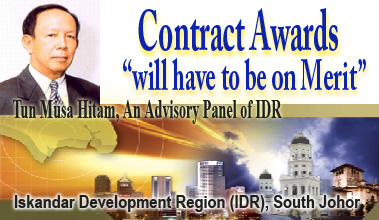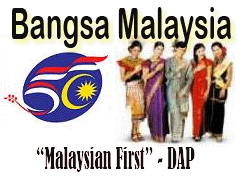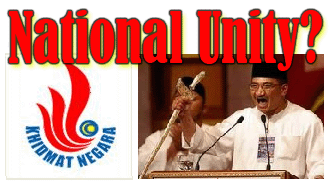Archive for March 23rd, 2007
Why still no Chief Judge of Malaya after 2 1/2 months?
Posted by Kit in Court, Parliament on Friday, 23 March 2007

Fourthly, on an independent judiciary — Malaysia was held in high international esteem until the 1988 judicial crisis, and the nation has not fully recovered from the trauma and fall-outs of the successive series of judicial crisis for the ensuing 15 years. How to restore full public confidence in the system of justice in the country?
The answer by the Minister in the Prime Minister’s Department, Datuk Nazri Aziz to Karpal Singh (DAP-Bukit Glugor) yesterday that the government has no plans to set up a Judicial Commission for the appointment of judges is most deplorable.
What is even more shocking is that this is also the view of the Chief Justice, Tun Ahmad Fairuz Sheikh Abdul Halim who had likened the proposal for an independent judicial commission on appointment and promotion of judges as akin to nudity rather than transparency. Such comment by the higher judicial officer in the land is most ill-advised, in poor taste and reflect badly on the office of Chief Justice.
Ahmad Fairuz may be unhappy with the proposal of an independent judicial commission to oversee the selection and promotion of judges, but he should realize that this proposal pre-dates his appointment to the top judicial post in the land and meant to enhance public confidence in the system of justice and in that context, there is nothing personal against any personal holder of the office.
Ahmad Fairuz should not have questioned the motives of those who had made the proposal, such as the Bar Council and several prominent lawyers, posing the rhetorical question: “Are we to allow whoever has cases in court and who lost to decide on the fate of judges?” He ignores the support of retired judges for the proposal.
It is absolutely wrong and inapt to categorise the proposal of an independent Judicial Commission as an exercise in nudity rather than transparency, especially when this judicial reform had been adopted by other countries such as Canada, New Zealand, South Africa and the United Kingdom. Read the rest of this entry »
Musa Hitam’s merit call for IDR to attract FDIs – extend to whole country
Posted by Kit in NEP, Parliament on Friday, 23 March 2007

Thirdly, on international competitiveness.
The Royal Address quoted the World Competitiveness Yearbook 2006 where Malaysia’s position has improved from 28th place in 2005 to 23rd place in 2006.
Since last month, the government has tried to generate a “feel good” atmosphere among the people with the message that good economic times are back.
Parliament was told that since 3rd January 2007, the Bursa Malaysia Composite Index has been recording an encouraging performance and exceeded 1,200 points, a level which has not been reached since the Asian currency crisis in July 1997. There was the record 2006 trade volume breaching RM1 trillion. We are told that in 2006, “total investments in the country remained strong, reaching its highest level in the history of our nation”.
On February 13, International Trade and Industry Minister, Datuk Seri Rafidah Aziz announced that Malaysia is back on the global investment map, with a record RM46 billion investments in 1,077 approved manufacturing projects last year by local and foreign investors — a 48 per cent jump from the RM31 billion invested in 2005. This was made up of RM20.2 billion of foreign investments and RM25.8 billion in local investments.
Is the government right that Malaysia is “out of the woods”, dispelling the gloomy news in the past few months that Malaysia is in danger of dropping out from the radar of foreign investors because of increasing lack of international competitiveness, whether in efficiency of public service, quality of education, good governance, transparency and integrity?
The United Nations Conference Trade and Development (Unctad) World Investment Report 2006 last October revealed unflattering figures about Malaysia for the year 2005, viz: Read the rest of this entry »
PM – address cumulative Article 11 concerns
Posted by Kit in Human Rights, nation building, Parliament, Religion on Friday, 23 March 2007
Secondly, on Inter-religious relations today and the past 50 years. In the first two decades of nationhood, the government sponsored the establishment of a Inter-Religious Council headed by a Cabinet Minister to promote inter-religious dialogue, understanding and goodwill. Today, a very similar proposal, the Inter-Faith Council, is regarded as highly sensitive and intolerable by the government-of-the day. What has gone wrong?
It is most regrettable that despite six requests in the past nine months, the Prime Minister has refused to meet the Article 11 coalition of 11 civil society groups to uphold the Federal Constitution as the supreme law of the land — or even to give any response.
Why is the Prime Minister who preaches inter-religious dialogue in international conferences adopting such a hostile attitude to Article 11 and domestic inter-religious dialogue?
Non-Muslim concerns about religious freedom as entrenched in Article 11 have been re-ignited by the latest Court of Appeal judgment in the R. Subashini case.
Just like the S. Shamala case in 2004, the Hindu women found they could not seek legal remedy in the civil courts to protect their rights after their husbands converted to Islam and unilaterally converted their children.
Read the rest of this entry »
“Bangsa Malaysia” – has it been abandoned by Cabinet, UMNO and BN?
Posted by Kit in nation building, Parliament on Friday, 23 March 2007

It is most ironical and tragic that the government’s nation-building objectives had come under a cloud on the occasion of the nation’s 50th Merdeka anniversary — whether the Barisan Nasional government is still committed or has abandoned the objective of creating a Bangsa Malaysia.
After the denunciation of the Bangsa Malaysia concept and objective by the Johore Mentri Besar, Datuk Abdul Ghani Othman at a Umno Johore conference in early November last year – a run-up to the “fire-and-brimstone” Umno and Umno Youth general assemblies the following week — the Federal and State Governments appear to have distanced themselves from the Bangsa Malaysia objective.
Let us not forget history. The Bangsa Malaysia concept was proclaimed in Vision 2020 in 1991 with the objective that it be achieved within three decades in 2020 with the emergence of a people entirely Malaysian in perspective, transcending ethnic, religious and cultural differences
This was how Tun Dr. Mahathir Mohamad, who proclaimed Viksion 2020, explained the Bangsa Malaysia concept at the time:
This is the report from the Star (Sept. 11, 1995), which carried the front-page headline “ESCHEW ETHNICITY’, with a secondary headline of “PM: Be proud of being Malaysians”:
“Kuala Lumpur – Datuk Seri Dr. Mahathir Mohamad said Malaysians should reduce their strong sense of ethnicity in order to achieve Bangsa Malaysia.
“He said citizens should be proud of being Malaysians and work together instead of being preoccupied with ethnic origin.
“‘Bangsa Malaysia means people who are able to identify themselves with the country, speak Bahasa Malaysia and accept the Constitution,’ he said at a dialogue with the Malaysian Students Executive Council of the United Kingdom here yesterday.
“The Prime Minister said to realise the goal of Bangsa Malaysia, the people should start accepting each other as they are, regardless of race and religion.
” Dr. Mahathir said certain quarters may condemn him for wanting to achieve Bangsa Malaysia and not struggling for the Malay cause as he did during his early years in politics.
“He said when he was fighting for the Malay cause per se, he was young and his thoughts were that of an inexperienced politician. Read the rest of this entry »
National service programme and Hisham’s keris-wielding
Posted by Kit in nation building, Parliament on Friday, 23 March 2007

This year is a the 50th Merdeka Anniversary for the nation.
There are two ways to celebrate the half-century of nationhood – in a lavish expenditure of public funds in fireworks, extravaganzas and pageantry or to celebrate it in a meaningful manner to instill greater national solidarity and sense of purpose in the nation’s journey to achieve a Bangsa Malaysia and a fully developed nation status.
Parliament, as the highest political forum in the land, should set the national example to celebrate the half-century of our nationhood in a meaningful manner, with Malaysians regardless of race, religion, class or political beliefs standing up for fair, just and progressive nation-building policies to create towering Malaysians and to stop Malaysia’s loss of international competitiveness.
The most meaningful way to celebrate the country’s half-century of nationhood is to seek a national consensus as to what had gone wrong with nation-building and how we can learn from the mistakes and failures of the past decades so that we can be more successful in the next 50 years, in particular on the following issues:
Firstly, National unity — why after nearly five decades of nationhood, race relations in Malaysia is “not good, fragile and brittle”, as publicly admitted by the Prime Minister recently. Racial and religious polarization have never been more serious today than in the past five decades.
The introduction of the national service training programme in 2004 is testimony of the failure of the national education system to create national unity in the country — and this is no surprise when the Education Minister, Datuk Seri Hishamuddin Hussein is the very symbol and cause of such polarization with his racist keris-wielding histrionics at Umno general assemblies. Read the rest of this entry »
